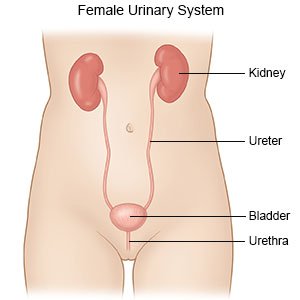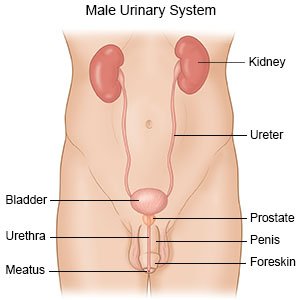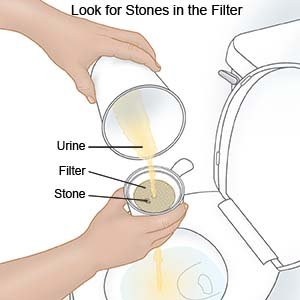Renal Colic
Medically reviewed by Drugs.com. Last updated on Aug 4, 2025.
AMBULATORY CARE:
Renal colic
is severe pain in your lower back or sides. The pain is usually on one side, but may be on both sides of your lower back. Renal colic may start quickly, come and go, and become worse over time.
 |
 |
Other signs and symptoms that may occur with renal colic:
- Severe low back, abdominal, or groin pain
- Pain when you urinate
- Nausea and vomiting
- Feeling the need to urinate often, or right away
- Urinating less than what is normal for you, or not at all
- Fever
Seek care immediately if:
- You cannot stop vomiting.
- You see new or increased bleeding when you urinate.
- You are urinating less than usual, or not at all.
- Your pain is not getting better even after treatment.
Call your doctor if:
- You have fever.
- You need to urinate more often than usual, or right away.
- You see a stone in your urine strainer after you urinate.
- You have questions or concerns about your condition or care.
Treatment
may include any of the following:
- Medicines may help decrease pain and muscle spasms. You may also need medicine to calm your stomach and stop vomiting.
- Surgery may be needed to remove a blockage. Surgery may also be needed if your kidneys are not working properly.
Manage your symptoms:
- Drink liquids as directed. This will help decrease pain and flush blockages from your urinary tract. Ask how much liquid to drink each day and which liquids are best for you. You may need to drink about 3 liters (12 glasses) of liquids each day. Half of your total daily liquids should be water. Limit coffee, tea, and soda to 2 cups daily. Your urine should be pale and clear.
- Strain your urine every time you urinate. Urinate into a strainer (funnel with a fine mesh on the bottom) or glass jar to collect kidney stones. Give the kidney stones to your healthcare provider at your next visit.

- Eat a variety of healthy foods. Healthy foods include fruits, vegetables, whole-grain breads, low-fat dairy products, beans, lean meats, and fish. You may need to increase the amount of citrus fruit you eat, such as oranges. Ask your healthcare provider how much salt, calcium, and protein you should eat.

- Avoid activity in hot temperatures. Heat may cause you to become dehydrated and urinate less.
Follow up with your doctor as directed:
You may need to return for tests to check if your blockage has cleared. Write down your questions so you remember to ask them during your visits.
© Copyright Merative 2025 Information is for End User's use only and may not be sold, redistributed or otherwise used for commercial purposes.
The above information is an educational aid only. It is not intended as medical advice for individual conditions or treatments. Talk to your doctor, nurse or pharmacist before following any medical regimen to see if it is safe and effective for you.
Learn more about Renal Colic
Treatment options
Care guides
Further information
Always consult your healthcare provider to ensure the information displayed on this page applies to your personal circumstances.
